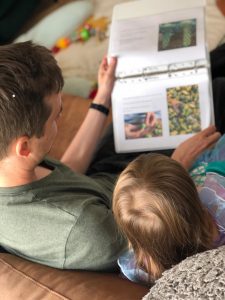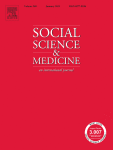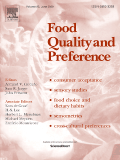
ESR8 Andreia and her supervisor, Jessica Aschemann-Witzel developed a storybook to increase children and fathers’ willingness to try new vegetables and spices. The book is a strategy to address barriers for healthy eating among Danish families. In previous investigation Danish mothers indicated child’s and partner’s resistance to try new vegetables as a constraint for a more varied diet…

Fifteen Danish families are taking part in “My daddy is a food explorer” – a food intervention for fathers&kids. In previous investigation Danish mothers indicated child’s and partner’s resistance to try new vegetables as a constraint to a more varied diet in the household (Moura & Aschemann-Witzel, 2020). “My daddy is a food explorer” is an attempt to make healthy eating easier and more…

The year 2020 was a special year, and that’s even an understatement. The highly contagious coronavirus SARS-CoV-2 sparked a worldwide pandemic and the year turned out differently than expected. This year, working from home was enforced or privileged and we were confronted with many uncertainties. Studies had to be reorganized, and several conferences I was…

The results suggest that online nutrition content about sugar causes negative feelings and distress among parents The research was conducted by #ESR8 Andreia and Jessica Aschemann-Witzel in Aarhus University – Denmark. The researchers analyzed content posted by parents about sugar on Facebook and blogs. In the online discussions, sugar consumption appeared as a two-sided experience,…

A recent study suggest that parents feel overwhelmed wit online nutrition content about sugar and other dietary issues. In this Infographics, recommendations for communication with parents based on their interest are presented. The recommendations are based on this study by Andreia Ferreia de Moura (ESR8).

There have been different studies established in the field of taste sensitivity and food liking. However, it is still uncertain how different taste sensitivity measures relate to each other and to food liking, especially in preadolescent subjects. Our study aimed to investigate the relationship between basic tastes sensitivity, fattiness sensitivity, and food liking in preadolescents.…

When I got offered the junior researcher position in Wageningen I got extremely excited. Just after completing my Masters, I was planning on moving to the Netherlands as I am originally from Germany. Besides new opportunities a new environment and exciting job tasks, I imagined myself getting to know my new colleagues, participating in interesting…

Tija Rageliene (ESR9) recently published a paper one how social norms influence preadolescents eating behaviour in BMC public health, below you can read a summary of the paper, for the full paper, please see here Preadolescents’ friendships are more than a social matter for your children’s health When children develop, and approach adolescence age the…

Andreia (ESR8) have written a blog-post on her experiences during the Covid-19 situation: I feel lucky and in a privileged position during these difficult corona times. I haven’t fallen sick so far, neither has anybody close to me. I have the best job one can possibly have now. It’s perfectly possible to work from home and I run no risk of becoming unemployed due to the…

Martina Galler (ESR1) recently published her first paper “How children approach a CATA test influences the outcome. Insights on ticking styles from two case studies with 6–9-year old children“ within EDULIA in “Food Quality and Preference”. A summary of the paper is given below, for the full paper please visit our publication page. DOI: https://doi.org/10.1016/j.foodqual.2020.104009 …









